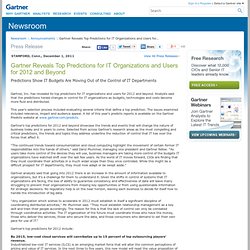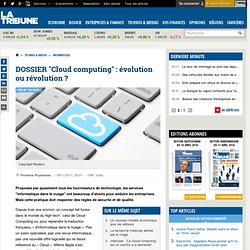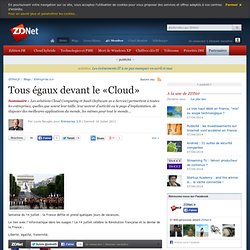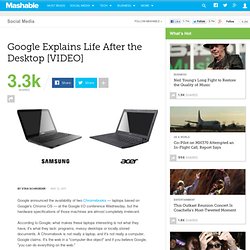

Reveals Top Predictions for IT Organizations and Users for 2012 and Beyond. STAMFORD, Conn., December 1, 2011 View All Press Releases Predictions Show IT Budgets Are Moving Out of the Control of IT Departments Gartner, Inc. has revealed its top predictions for IT organizations and users for 2012 and beyond.

Analysts said that the predictions herald changes in control for IT organizations as budgets, technologies and costs become more fluid and distributed. This year's selection process included evaluating several criteria that define a top prediction. The issues examined included relevance, impact and audience appeal. Gartner's top predictions for 2012 and beyond showcase the trends and events that will change the nature of business today and in years to come. "The continued trends toward consumerization and cloud computing highlight the movement of certain former IT responsibilities into the hands of others," said Daryl Plummer, managing vice president and Gartner fellow. Gartner's top predictions for 2012 include: Mr. Contacts About Gartner. Cloud Computing : comment choisir son fournisseur - Journal du Net Solutions. DOSSIER Cloud Computing : évolution ou révolution ? Depuis trois ans environ, un concept fait fureur dans le monde du high-tech : celui de Cloud Computing ou, pour reprendre la traduction française, « d'informatique dans le nuage ».

Pas un salon spécialisé, pas une revue informatique, pas une nouvelle offre logicielle qui ne fasse référence au « Cloud ». Même Apple s'est converti à cette terminologie en lançant son nouveau service de stockage des données personnelles, « iCloud ». Selon le cabinet Pierre Audoin Consultants (PAC), en 2011, le marché du Cloud devrait atteindre plus d'1 milliard d'euros en France avec une progression de près de 30 % en un an. Mais si le terme est de plus en plus utilisé, sa véritable signification reste floue, voire brumeuse, pour bon nombre d'entreprises. Le principe du Cloud est pourtant assez simple.
Intérêt multiple On peut les diviser aujourd'hui en trois grandes familles: le SaaS (Software as a Service), le IaaS (Infrastructure as a Service) et le PaaS (Platform as a Service). Négociation contractuelle. Cloud Computing May be a Shot in the Arm our Economy Needs. With Bitcasa, The Entire Cloud Is Your Hard Drive For Only $10 Per Month. The cloud is now your hard drive. And not just a few dozen Gigabytes, Terabytes or even Petabytes, but all of it – infinite storage – for only $10 per month. This is the incredible promise of the new TechCrunch Disrupt finalist Bitcasa. The company is launching a new cloud storage, syncing and sharing service that blows away its competitors, including hard drive manufacturers and online services like DropBox and SkyDrive, with ease. In fact, beyond the pricing and limitless storage, the most disruptive thing about the service is its complete integration with your device.
You don’t see it, it’s not an icon on your desktop, you don’t drag-and-drop files or folders into it. The idea of using the cloud to store files or sync files between devices is not new. But Bitcasa is not like any of those services. When you save a file, Bitcasa writes those 1′s and 0′s to its server-side infrastructure in the cloud. And the pricing! That’s the easy part, actually. MP: Sounds terrific. Tous égaux devant le «Cloud»
Semaine du 14 juillet : la France défile et prend quelques jours de vacances.

Le lien avec l’informatique dans les nuages ? Le 14 juillet célèbre la Révolution française et la devise de la France : Liberté, égalité, fraternité. Je parle souvent dans ce blog de «révolution» à propos du Cloud et en particulier de la R2I, Révolution Industrielle informatique. Il m’est donc venu l’idée de proposer une devise pour cette révolution du Cloud : Summit Slides. France Inter > L'édito éco. Google Explains Life After the Desktop. Google announced the availability of two Chromebooks — laptops based on Google's Chrome OS — at the Google I/O conference Wednesday, but the hardware specifications of those machines are almost completely irrelevant.

According to Google, what makes these laptops interesting is not what they have, it's what they lack: programs, messy desktops or locally stored documents. A Chromebook is not really a laptop, and it's not really a computer, Google claims. It's the web in a "computer-like object" and if you believe Google, "you can do everything on the web. " Of course, the lack of desktop software does have some benefits, such as a startup time as fast as 8 seconds. Furthermore, the fact that your files are stored in Google's cloud mean they're quite safe: You can literally throw your Chromebook into a river and you won't lose your stuff.
The question, however, is whether the world is ready to completely move into the cloud?
Cloud Computing.